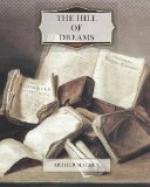Lucian did not want any cider, but he thought it would please old Morgan if he took some, so he said he should like to taste the cider very much indeed. Morgan was a sturdy, thick-set old man of the ancient stock; a stiff churchman, who breakfasted regularly on fat broth and Caerphilly cheese in the fashion of his ancestors; hot, spiced elder wine was for winter nights, and gin for festal seasons. The farm had always been the freehold of the family, and when Lucian, in the wake of the yeoman, passed through the deep porch by the oaken door, down into the long dark kitchen, he felt as though the seventeenth century still lingered on. One mullioned window, set deep in the sloping wall, gave all the light there was through quarries of thick glass in which there were whorls and circles, so that the lapping rose-branch and the garden and the fields beyond were distorted to the sight. Two heavy beams, oaken but whitewashed, ran across the ceiling; a little glow of fire sparkled in the great fireplace, and a curl of blue smoke fled up the cavern of the chimney. Here was the genuine chimney-corner of our fathers; there were seats on each side of the fireplace where one could sit snug and sheltered on December nights, warm and merry in the blazing light, and listen to the battle of the storm, and hear the flame spit and hiss at the falling snowflakes. At the back of the fire were great blackened tiles with raised initials and a date.—I.M., 1684.
“Sit down, Master Lucian, sit down, sir,” said Morgan.
“Annie,” he called through one of the numerous doors, “here’s Master Lucian, the parson, would like a drop of cider. Fetch a jug, will you, directly?”
“Very well, father,” came the voice from the dairy and presently the girl entered, wiping the jug she held. In his boyish way Lucian had been a good deal disturbed by Annie Morgan; he could see her on Sundays from his seat in church, and her skin, curiously pale, her lips that seemed as though they were stained with some brilliant pigment, her black hair, and the quivering black eyes, gave him odd fancies which he had hardly shaped to himself. Annie had grown into a woman in three years, and he was still a boy. She came into the kitchen, curtsying and smiling.
“Good-day, Master Lucian, and how is Mr. Taylor, sir?”
“Pretty well, thank you. I hope you are well.”
“Nicely, sir, thank you. How nice your voice do sound in church, Master Lucian, to be sure. I was telling father about it last Sunday.”
Lucian grinned and felt uncomfortable, and the girl set down the jug on the round table and brought a glass from the dresser. She bent close over him as she poured out the green oily cider, fragrant of the orchard; her hand touched his shoulder for a moment, and she said, “I beg your pardon, sir,” very prettily. He looked up eagerly at her face; the black eyes, a little oval in shape, were shining, and the lips smiled. Annie wore a plain dress of some black stuff, open at the throat; her skin was beautiful. For a moment the ghost of a fancy hovered unsubstantial in his mind; and then Annie curtsied as she handed him the cider, and replied to his thanks with, “And welcome kindly, sir.”




